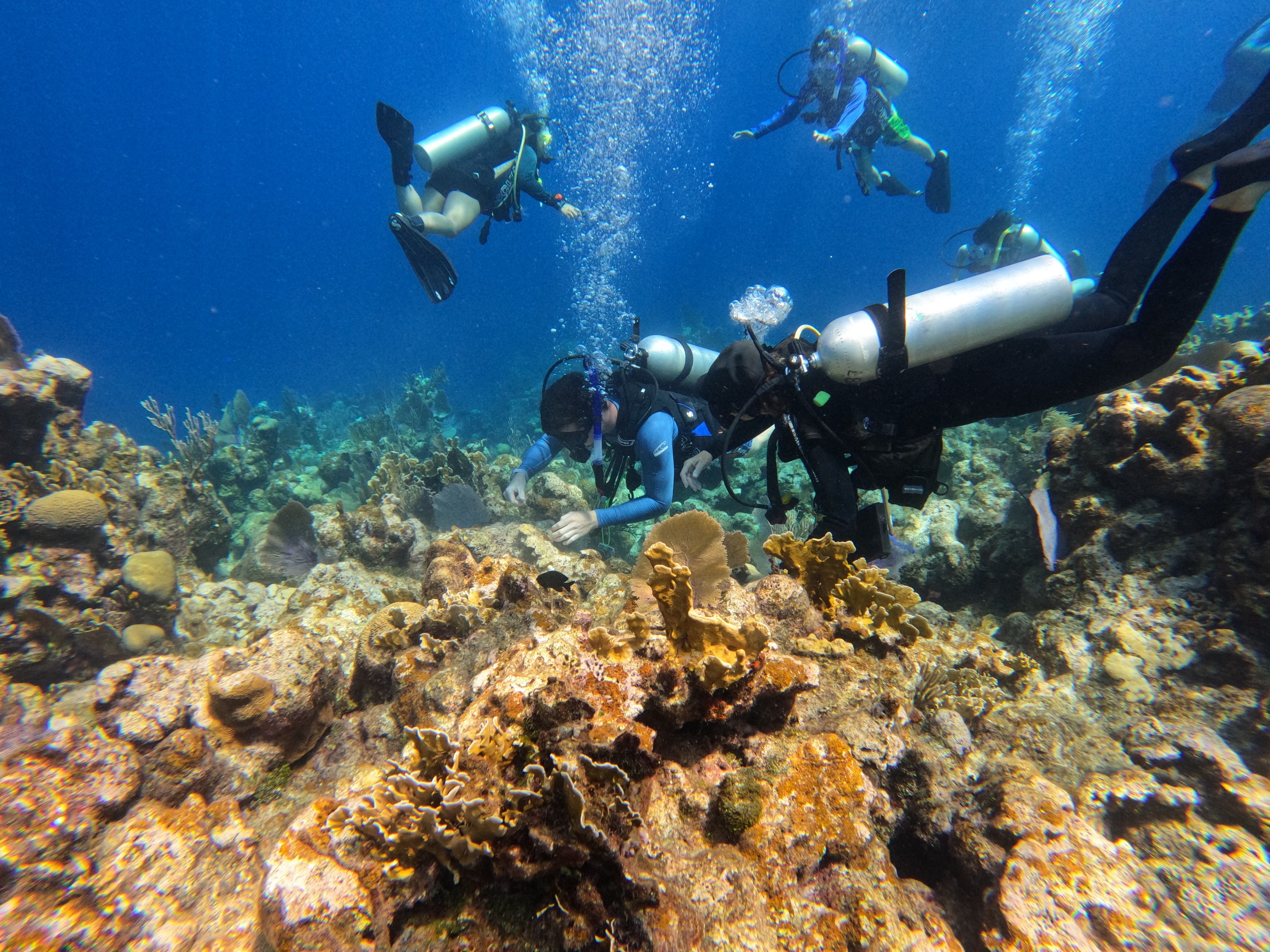With the fall semester well underway, we are reflecting on the amazing international experience that cadets and faculty in Cal Maritime’s oceanography program had this summer.
The group traveled to Roatan, Honduras, for an immersive international experience course focused on tropical marine ecology. Situated along the Mesoamerican reef, Roatan is renowned for its exceptional scuba diving opportunities and vibrant marine life.
Rising Temperatures
The summer of 2023 made headlines across the globe as soaring temperatures dominated weather reports. Unprecedented heat waves swept through the United States and Europe, shattering long-standing temperature records. However, the impact of these rising temperatures extended beyond land, as oceans also experienced unusually warm conditions. The Atlantic, Pacific, and Mediterranean seas all bore witness to temperatures higher than the norm, raising concerns about the health of marine ecosystems.
A combination of factors has been identified as contributors to this alarming pattern. The climate phenomenon known as El Niño, coupled with the ongoing effects of climate change, is believed to be important drivers of these abnormal conditions. El Niño, characterized by warmer-than-average sea surface temperatures in the central and eastern Pacific Ocean, has far-reaching effects on global weather patterns. When combined with the long-term warming trend caused by human activities, the result is a perfect storm of heat waves and rising ocean temperatures.
One stark example were conditions in the Florida Keys, where water temperatures surged to a staggering 100 degrees Fahrenheit, a significantly higher temperature than what is considered normal for this area. The Keys are home to the third-largest coral reef system in the world, making this rise in temperature particularly troubling. Warm waters are known to be lethal to coral reefs, making them more susceptible to disease and leading to a phenomenon called coral bleaching.
In the face of these changes, cadets and faculty in Cal Maritime’s oceanography program have taken on the task of documenting shifts in ocean conditions.
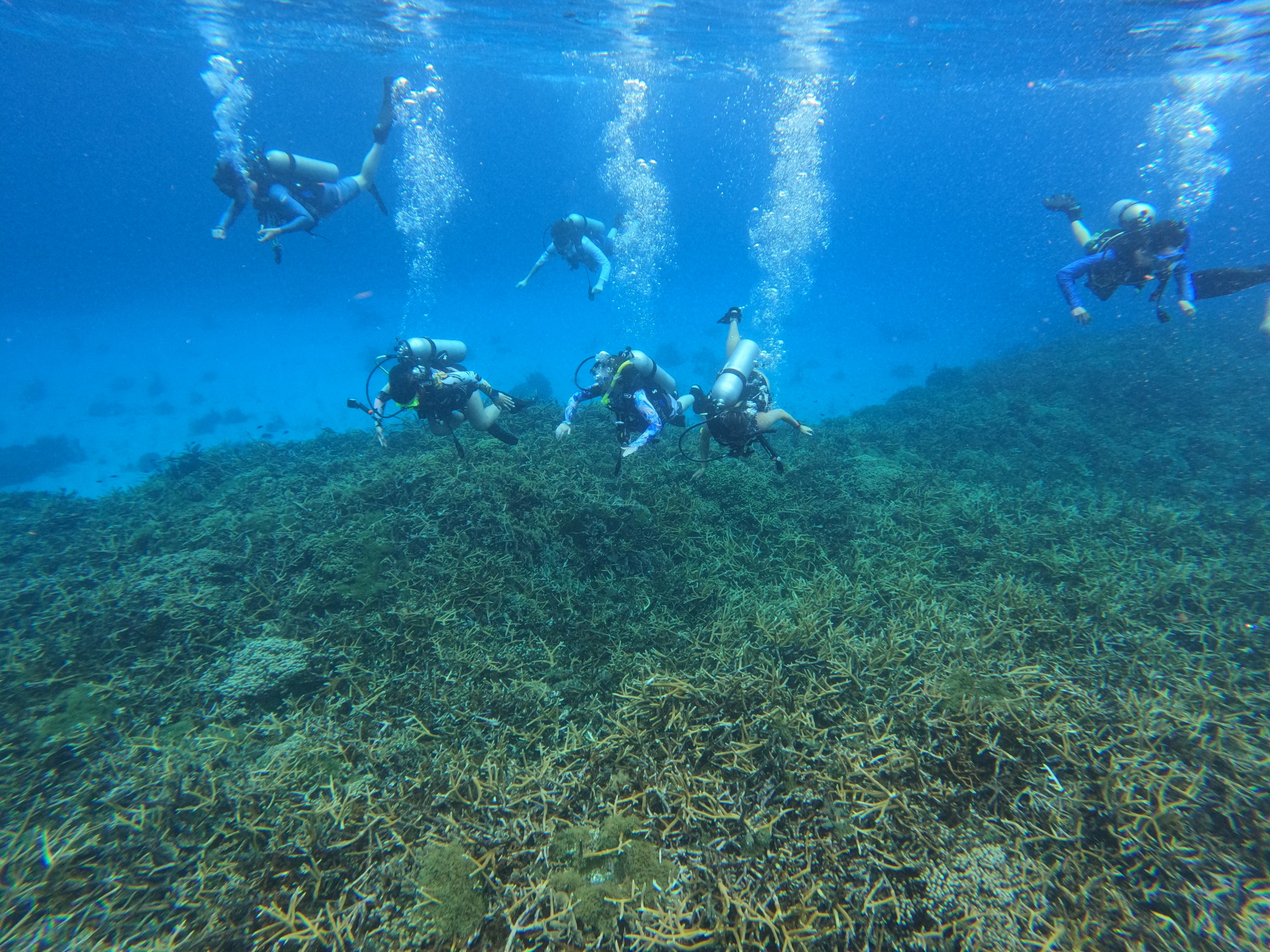
Cal Maritime oceanography cadets scuba diving at Smith Bank, Roatan, Honduras.
A Dive into Coral Reef Ecosystems
During their time in Roatan, cadets explored the intricate functioning and structure of coral reef ecosystems. They learned about the vital services these ecosystems provide to humans and the various threats they face, including the ongoing disease and bleaching events. As part of their educational journey, cadets installed a network of low-cost temperature sensors around Roatan in partnership with a Bay Area high school and the Roatan Institute for Marine Science. These sensors, recording water temperatures once a day, are set to gather data for an entire year, contributing valuable insights into the changing marine environment.
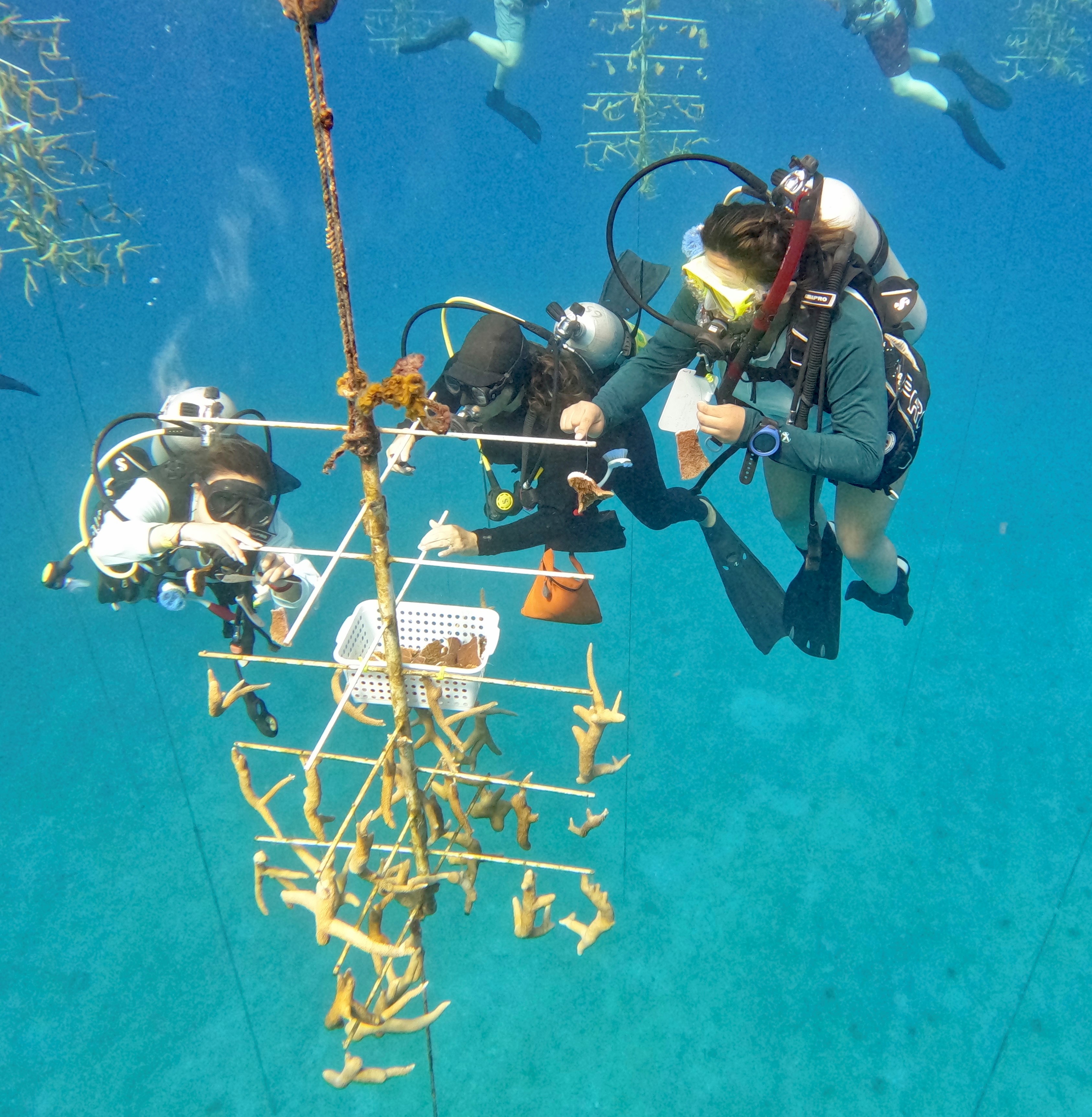
Working at the coral nursery. Small pieces of genetically diverse corals will spend several months suspended from PVC trees and grow before being outplanted back onto the reef.
Home Base: Analyzing the Data
Cal Maritime cadets will continue to work with data from the sensors throughout the academic year in their classes and through various research projects. Dr. Alexander Parker, interim dean of the School of Letters and Sciences, and oceanography program coordinator and trip leader, highlighted the significance of firsthand experiences for the cadets.
"Even during our visit in mid-May, we experienced much warmer than typical water temperatures on the reef," said Parker. "Cadets had first-hand experience with these marine heatwaves that are being reported. It is one thing to read about these events, but to feel currents of hot water moving through the reef system was truly shocking."
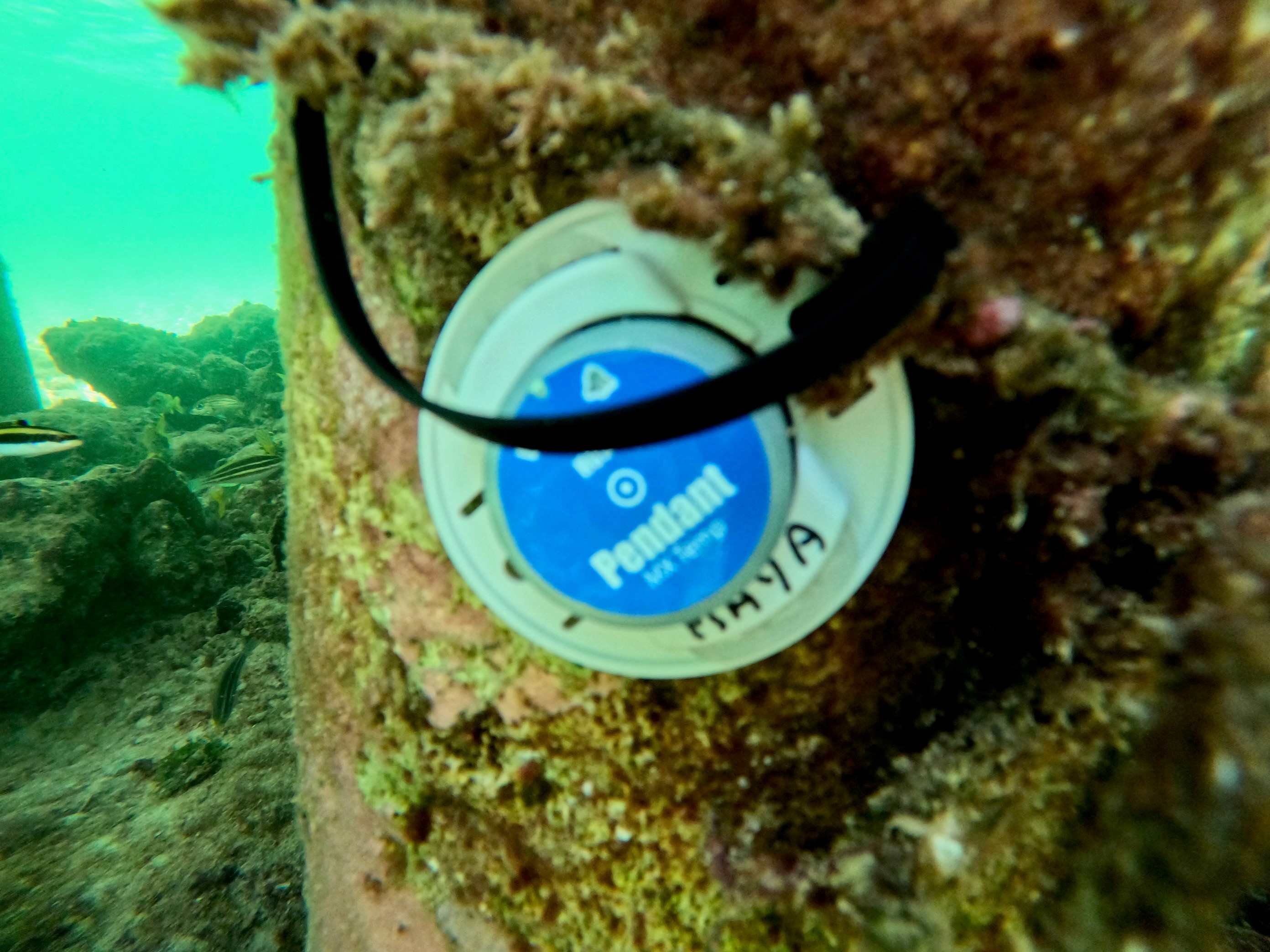
Temperature sensors were placed at several locations in Roatan and will monitor water temperature over the course of the year.
Closer to their home base, oceanography faculty and cadets have been hard at work this fall semester with the ongoing design and construction of an ocean-observing mooring. This mooring will collect data on water temperatures, atmospheric conditions, wave dynamics, and water chemistry and will contribute to a large effort to understand shifts in our local ecosystem. Last summer, an alarming harmful algal bloom was documented in the San Francisco Estuary. This event, once considered improbable due to the bay's tidal nature and turbid conditions, now poses a new challenge for natural resource agencies.
As summer of 2023 has come to a close, the world continues to grapple with the consequences of rising temperatures. From coral reefs to coastal bays, the impact of these changes reverberates through ecosystems and underscores the urgency for trained ocean scientists to be ready to address climate change and its effects on the delicate balance of our ocean.
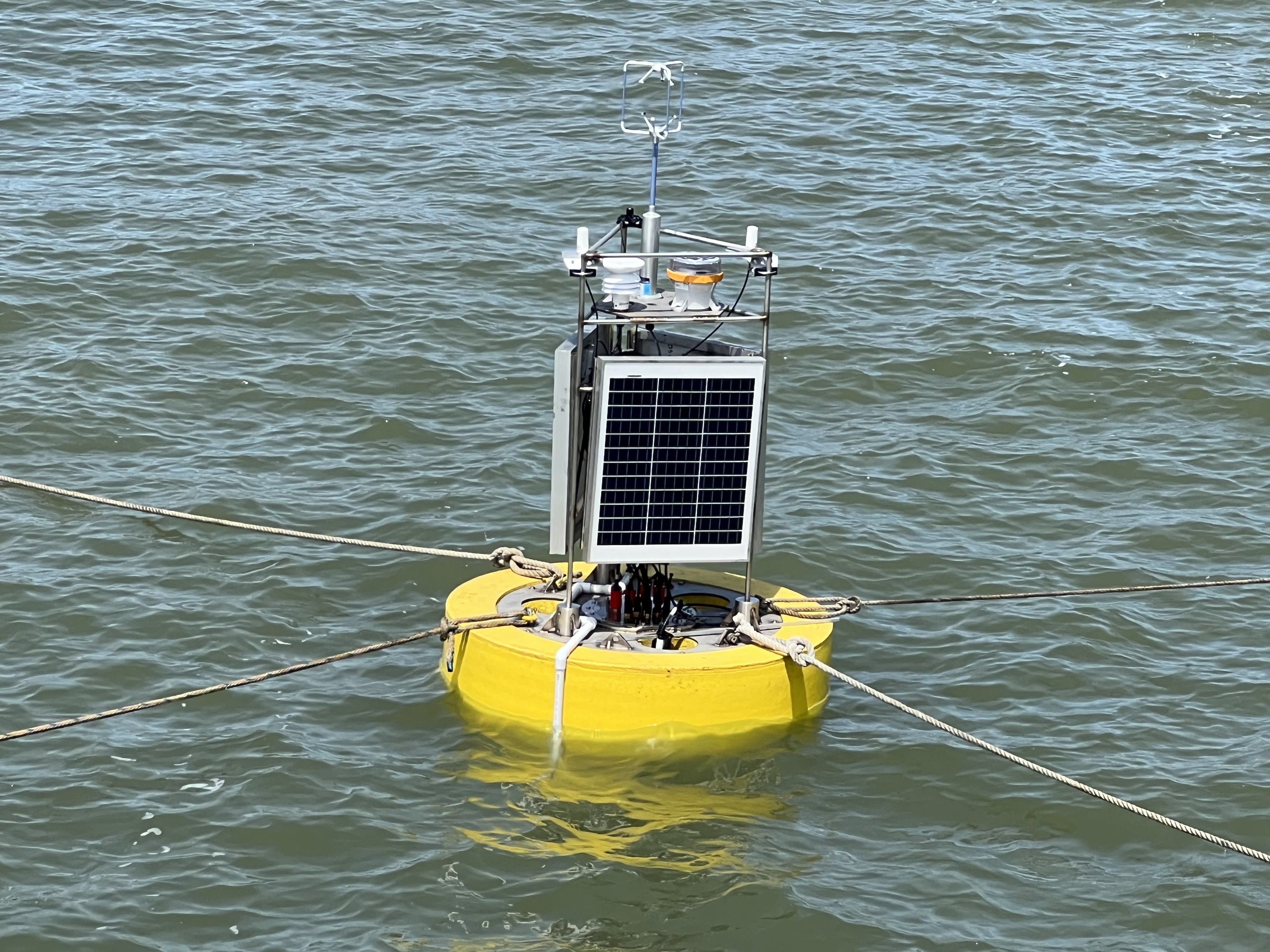
Cal Maritime’s ocean observing buoy deployed in San Pablo Bay for a float test during May 2023. The buoy was designed and fabricated in partnership between mechanical engineering and oceanography faculty and cadets.
Join Us!
Learn more about adventures like these at the Keelhauler Days: CommUNITY Spirit Showcase on Thursday, Oct. 5. An International Experience presentation is scheduled at 11 a.m. in Rizza Auditorium. Discover more about how we instill global awareness as a cornerstone of our educational mission, offering cadets a transformative journey through international travel and study abroad. This event highlights our flagship three-credit summer course, led by esteemed faculty members and cadets earning their B.A. in Global Studies and Maritime Affairs, B.S. in International Business and Logistics, and B.S. in Oceanography programs. Hear inspiring stories from current cadets who will share their life-changing experiences and profound insights gained from immersing themselves in diverse cultures. Don't miss this opportunity to explore how Cal Maritime is shaping the next generation of global leaders.
Photos submitted by Dr. Alex Parker who also contributed to this story.
ABOUT CAL MARITIME
Established in 1929, California State University Maritime Academy is the only degree-granting
maritime academy on the West Coast. Located in Vallejo, California, the campus offers
undergraduate degrees that prepare students for careers in engineering, transportation,
international relations, business, and global logistics. Cal Maritime also offers
a master’s degree in Transportation and Engineering Management, as well as a number
of extended learning programs and courses.
